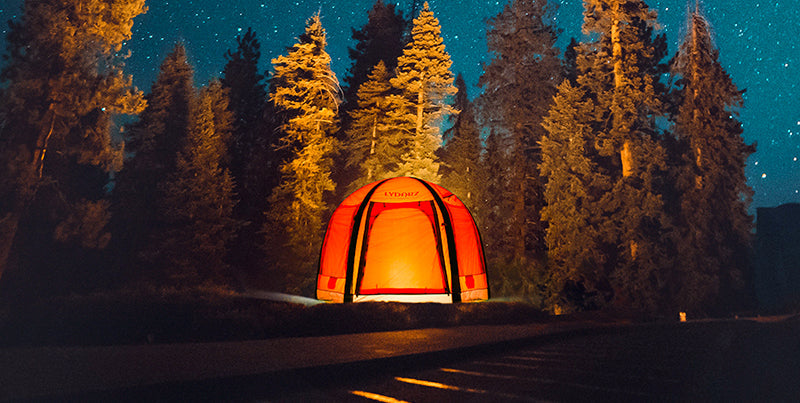Camping is one of the best ways to reconnect with nature, and there’s something truly magical about camping under the stars. It offers an escape from the hustle and bustle of everyday life and lets you immerse yourself in the tranquility of the outdoors. However, to ensure a smooth and enjoyable experience, it's important to know how to prepare. In this blog, we’ll share some essential camping tips to help you enjoy your stargazing adventure to the fullest.
1. Choosing the Right Campsite
The first step in a successful camping trip is selecting the right campsite. Whether you're heading to a national park, mountains, or a lakeside campground, the location is key to your overall experience.
-
Accessibility: Make sure the campsite is easy to access, especially if you're hiking in.
-
Flat Ground: Look for a flat, level spot to set up your tent. Uneven ground can make for an uncomfortable night's sleep.
-
Water and Amenities: If possible, choose a campsite with a water source nearby and clean bathroom facilities. This will make your trip more convenient.
2. Packing the Right Gear
Having the right gear is essential for a comfortable and enjoyable camping experience. The basics include a tent, sleeping bag, and mattress, but choosing quality equipment can make all the difference.
-
Tent Selection: Pick a tent that's suited for the weather and number of campers. If you're camping in colder weather, make sure your tent offers good wind and water resistance. Inflatable tents like the Lydarz Inflatable Tent are a great option for their quick setup and stability. With an inflatable design, you can set up camp in just minutes, giving you more time to enjoy the outdoors.
-
Sleeping Gear: Good rest is crucial during your camping trip, so make sure to pack a comfortable sleeping bag and mattress. Traditional camping mattresses can be uncomfortable, but an inflatable mattress like the Lydarz Inflatable Mattress provides both comfort and portability. It’s easy to inflate and offers excellent support, helping you get a good night’s sleep under the stars.
3. Dealing with Weather Changes
In the outdoors, the weather can be unpredictable, so it’s important to be prepared for all conditions.
-
Waterproof Gear: Bring a waterproof jacket and pants in case of rain. A sudden downpour can make things inconvenient, but with the right gear, you’ll stay dry and comfortable.
-
Temperature Variation: Temperatures can drop significantly at night, especially in the mountains. Be sure to bring warm layers, a cozy sleeping bag, and accessories like hats and gloves.
-
Sun Protection: During the day, the sun can be intense. Protect yourself with sunscreen, sunglasses, and a wide-brimmed hat to avoid sunburn.
4. Food and Water Planning
Having enough food and clean water is vital for a successful camping trip.
-
Easy-to-Prepare Meals: Bring lightweight, nutritious food that's easy to cook, like freeze-dried meals, canned food, or ready-to-eat snacks. High-energy snacks like nuts and granola bars are great for a quick pick-me-up during a hike or around the campfire.
-
Water Management: Make sure you have enough water for the duration of your trip. If your campsite is far from a water source, bring water bottles or a water filtration system to ensure you can drink safely.
5. Leave No Trace: Protecting the Environment
Camping is all about enjoying nature, but it's also important to preserve it. Follow Leave No Trace principles to minimize your impact on the environment.
-
Trash Disposal: Bring extra trash bags and make sure to take all your trash with you. Don’t leave behind any litter, even biodegradable materials like food scraps.
-
Respect Nature: Stick to designated trails and campsites to avoid damaging delicate vegetation. Avoid picking plants or disturbing wildlife.
-
Water Conservation: If you’re using a natural water source, use a portable water filter to prevent contamination.
6. Safety and First-Aid Prep
Even in the most peaceful natural settings, accidents can happen. Be sure to pack a first-aid kit and take basic safety precautions.
-
First-Aid Kit: Your kit should include band-aids, antiseptic wipes, gauze, pain relievers, and any personal medications. It’s also a good idea to bring along a pair of tweezers for removing splinters or ticks.
-
Fire and Lighting: Bring a windproof lighter, matches, or a fire starter kit. Also, don’t forget a reliable camping lantern or headlamp for nighttime activities and navigation.
-
Navigation Tools: If you plan to hike or camp in remote areas, bring a map and compass, or a GPS device to help you stay on track.
7. Enjoying the Night Sky
One of the best parts of camping is enjoying the stars above. Find a spot with minimal light pollution, lie back, and gaze up at the night sky. On clear nights, you'll be able to see countless stars, planets, and even shooting stars. If you’re lucky, you might catch a glimpse of the Milky Way!
Conclusion
Camping is all about embracing nature and disconnecting from the everyday world. By following these essential tips, you’ll ensure that your trip goes smoothly, and you’ll be able to fully enjoy the beauty of the outdoors. With the right preparation and equipment—like an easy-to-set-up tent and a comfy mattress—you’ll be ready to experience the magic of stargazing and the peacefulness of the wilderness. Happy camping!

